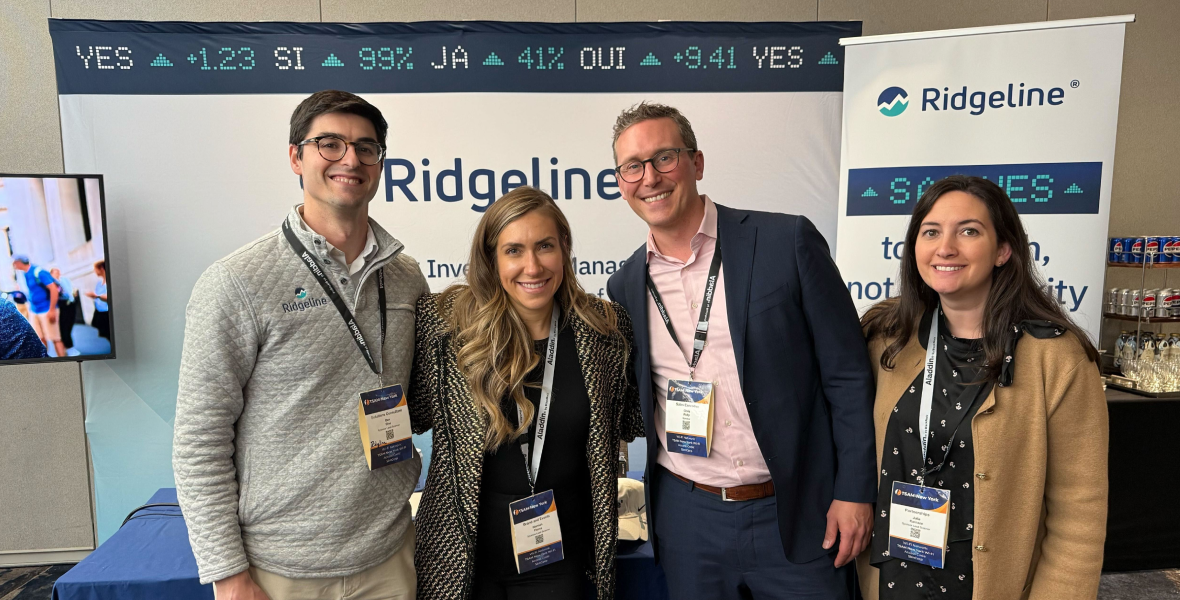
.avif)
Having the chance to attend and speak at TSAM New York 2025 reminded me how much the conversation in our industry has evolved. The focus has shifted from ideas to execution, from “what’s next” to “what’s working.” Held at the Marriott Marquis in Times Square on October 9, the event brought together leaders from asset management firms, asset owners, and institutional investors to discuss how firms can modernize operations, simplify access to data, and invest in technology built for real transformation.
Here are three conversations that stood out.
AI dominated the agenda, but the tone of the conversation has shifted slightly. Unlike previous years, where the focus was on what might be possible someday, speakers honed in on what’s working right now. Leaders shared how firms are applying AI to everything from research and trading to compliance and client reporting.
A clear distinction emerged between automation and intelligence. The first wave of AI adoption focused on automating repetitive, rules-based tasks to eliminate manual effort and reduce errors. The next wave is about intelligence: using AI to interpret complex data, support decision-making, and guide execution in real time. It’s less about replacing people and more about augmenting their expertise.
However, that enthusiasm came with a note of caution. Success with AI requires clarity of purpose, namely using technology to enhance human judgment, not replace it. Talk of AI now almost always comes with a qualifier: responsible. It’s a reminder that as adoption accelerates, firms need to put just as much emphasis on governance and accountability as they are on innovation.
Nothing gets done without data. So it’s fitting that data was the connective tissue in almost every discussion. Whether firms were talking about automation, reporting, or client engagement, data was the foundation.
We’re seeing a shift from reactive reporting to proactive intelligence. Clean, consolidated data is essential for trustworthy analysis, but firms are learning to use it in much more active ways. It’s no longer enough to track performance after the fact. Firms need to be able to surface insights in real time and guide decisions as they happen.
The phrase “data as a product” came up more than once. Firms are beginning to recognize data as a strategic asset with its own governance, quality standards, and business value. In an effort to harness the power of data, many firms have resorted to layering on new systems and tools that end up adding complexity even as they try to simplify.
That tension made the case for unified, cloud-native platforms even stronger. Consolidating both data and technology in one place allows firms to analyze, collaborate, and act faster without the friction of disconnected systems. When information flows freely across teams, data stops being something to manage and becomes something to use — to model risk, improve reporting accuracy, and drive better decisions across the business.
With all this talk about data and technology, the human element of transformation can easily be overlooked. But even the smartest systems fall flat without a culture that’s ready to use them.
Firms must rethink how they build and support teams: hire for hybrid skill sets, invest in continuous learning, and empower employees to work alongside AI rather than fear it. Consider reframing “change management” as “change enablement,” where the focus is on creating environments where experimentation is encouraged and innovation feels safe, not disruptive.
The conversation also extended beyond internal culture to how firms show up for clients. Transparency, responsiveness, and trust were recurring themes in the Marketing & Client Services sessions, where firms shared different ways they are using technology to strengthen, not replace, human connection. Digital tools may deliver speed and scale, but empathy still drives relationships.
Transformation is, at its core, a human project. The firms moving fastest aren’t just the ones with the best technology. They’re the ones building teams and cultures agile enough to use it well.
Ridgeline attended TSAM NY to learn from the industry and share how our customers automate complexity, accelerate collaboration, and deliver tailored client experiences at scale with a cloud-native system of record for the entire firm. With a single, real-time data set and embedded AI, Ridgeline gives ambitious firms the power to lead with confidence and disrupt the status quo.
This year, we participated in two session:
From Hype to Reality: Implementing Next-Gen Investment Operations Platforms
Leaders from STP Investment Services and Ridgeline discussed what it takes to bring all-in-one platforms live within operations teams. The fireside chat explored how workflows evolve, what governance models shift, and how service partners play a role in making transitions successful.
Unlocking the Power of "Yes": Applying AI to Deliver Customization at Scale
I joined Ridgeline Sales Executive Chris Ruby to dig into the “last mile” of AI application, showing how firms can use data and embedded intelligence to meet clients’ complex and evolving requirements without sacrificing scalability or control.
Curious to learn how Ridgeline can help unite your front, middle, and back-office operations? Request a demo or send us an email at hello@ridgelineapps.com.


